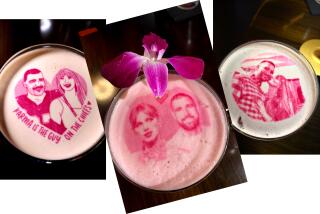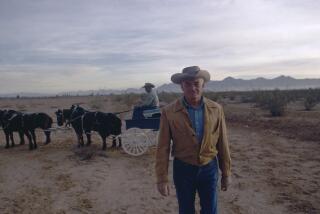Bar owner and Utah neighbors feud over copper bull’s ‘party-hat-shaped’ appendage
Here’s the story with the big copper penis, and every word of it is true.
Steve Ward was traveling from southern Utah to Las Vegas, as he often does — a little business, a little pleasure. Gleaming from the highway stood a giant copper statue of a bull.
------------
FOR THE RECORD: A previous version of this article referred to Zion National Park as Mt. Zion National Park.
------------
Ward has a thing for misfits. Here in Hurricane, pronounced, improbably, “hur-kun,” he is arguably the most prominent one. Barista’s, his bar and restaurant, hosts a carnival of oddities: wrought-iron signs affixed with pinup girls; a wall covered in drunken marker scrawl; a tiny two-seat table dressed in an ancient tablecloth and half-melted candles, perched 6 feet off the ground on a riser where Ward sometimes holds court.
Barista’s is also, in a county 70% Mormon, the only place you’ll find an ad showcasing under-clad women grinning from the side of the building in the approximate direction of the local high school, which is across the street.
Ward went home and told his wife, Pam, about what he saw in Vegas. The bull came back to him, crept into his thoughts when he imagined the next addition to his restaurant’s strange collection.
One day he left again, 100 miles southwest. And $130,000 later, he returned with the bull, which has no name. After several decades of marriage to a man like Ward, his wife is hard to shock.
“No,” she said, “I wasn’t surprised.”
Ward had a crane place it atop the sign of his restaurant. The town of Hurricane was aghast.
“Because of the penis,” Pam Ward said.
It was hard to miss. Against the unspoiled southern Utah vista of bright blue sky and striking red sandstone cliffs, the conical copper appendage resembled nothing so much as a varsity cheerleader’s megaphone.
“Party-hat-shaped,” declared the Independent newspaper in southern Utah.
Its resemblances, and merit, are in the eye of the beholder. And many who beheld it thought they had better call the mayor.
“We don’t like the reputation he gives to the city,” said City Manager Clark Fawcett. “The male organ on the bull was considerably bigger than his plan had showed. It wasn’t appropriate for this type of community.”
So began a long, ugly fight on message boards, the editorial pages and sometimes the sidewalk, where a shirtless man in a beat-up Mercedes was captured on an employee’s camera phone cursing the restaurant before punching the employee and smashing the phone.
What began as a complaint about decoration exposed a far wider simmering resentment against Ward and everything he touched.
Commentators to online stories and petitioners against his business license railed against the restaurant, its food, its cost, its staff, Ward’s family, his presence in town and just about everything about him.
“This establishment takes advantage of unsuspecting people who are unaware of the price gouging and should be stopped,” said Ross Ransom of Ivins, Utah, on a petition seeking to revoke Barista’s business license. “The owner is rude, condescending, arrogant, and way too full of himself. Not a good representation of the people of southern Utah.”
Pam Ward married a brawler. His attorney, before the City Council, called him a “passionate, even extreme individual.”
So it should have surprised no one when Steve Ward came out swinging, calling his opponents “burrito-eating punks” and flexing his 52-year-old biceps while interviewed in the local newspaper’s online television studio. Such conduct didn’t help him before the City Council, which denied Barista’s a hard-liquor license in March.
Fierce resistance gave way to quiet surrender. In late March, a welder went up on the roof. He worked on the bull and came down with what looked like a party hat. Ward set it on the bar.
For a while, that was that.
Southern Utah towns like Hurricane (population about 14,000) find themselves in a job and population boom that’s demanding more of formerly sleepy burghs — more hotels, more lodging, calls for a better city website. St. George, the closest city to Hurricane, ranked fifth on the list of fastest-growing areas in a March report by the U.S. Census Bureau.
Those new hires are creeping farther out to towns like Hurricane, long a way station for hikers headed for Zion National Park, which itself is becoming a bigger draw for wealthy adventure-sport tourists.
New people bring change. They keep restaurants like Barista’s open. And some longtime residents here are worried.
“The area is changing, and the [city] council is having to come to grips with that at some point,” said Fawcett, himself a member of the Mormon Church who nevertheless takes his wife to the Olive Garden in St. George, where they see people drink.
But as things turned out, the bull fracas did not end quietly after all.
After a month of relative silence, the mayor went on television to celebrate Ward’s capitulation.
Ward noticed.
And back up went the welder. And back on went the party hat.
With the battle lines firmly drawn, Pam Ward is confident she and her husband will prevail, though the bar was again denied a hard-liquor license in May — no one else in town has a license except the private Eagles Club. In the meantime, Barista’s can serve only beer and wine.
The Wards chose this town because Steve Ward’s parents once ran a hotel here. Pam and Steve Ward, who have operated Barista’s for 10 years, raised their children here. They contribute to the local economy and serve a role no one else in town will play, she said.
They abide by Utah’s alcohol rules, including the use of what Utahns call a “Zion curtain,” a barrier to block patrons’ view of the mixing of alcohol or opening of beer bottles. (The Wards use a walk-in freezer to stay out of sight.) They have as much claim to the town of Hurricane, she said, as those who want them gone.
“We will be here” — and here she banged the table — “until” — bang! — “the day” — bang! — “we die.”
Twitter: @nigelduara
More to Read
Start your day right
Sign up for Essential California for news, features and recommendations from the L.A. Times and beyond in your inbox six days a week.
You may occasionally receive promotional content from the Los Angeles Times.







